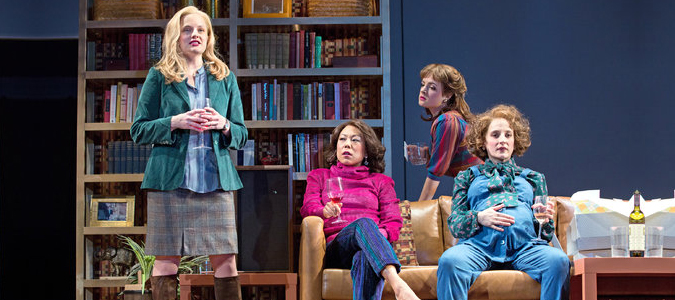

The Heidi Chronicles
Opening Night: March 19, 2015
Closing: May 3, 2015
Theater: Music Box Theatre
Elisabeth Moss, Jason Biggs, and Bryce Pinkham star in “The Heidi Chronicles,” Wendy Wasserstein’s Pulitzer Prize-winning comedy that traces the coming of age of Heidi Holland from high school in the ’60s to her career as an art historian in the ’80s. As Heidi determines her place in society and how to juggle success and failures in work, friendship and romance, The Heidi Chronicles asks the ever-present question: Can women have it all?
BUY TICKETSREAD THE REVIEWS:
March 19, 2015
Do the responsibilities that come with age inevitably erode the ideals of youth? Can women achieve the most in their careers while enjoying a fully satisfying family life? Is sadness a natural — as opposed to pathological — response to the realization that life will not bring us everything we had hoped it would? These questions resonate today as strongly, and at times as painfully, as they did when Wendy Wasserstein’s most celebrated play, “The Heidi Chronicles,” stormed Broadway in 1989, going on to win the best play Tony Award and the Pulitzer Prize the next year. They are being posed once again, with the same bright humor and reflective intelligence, in the vibrant revival that opened at the Music Box Theater on Thursday night, led by a softly radiant Elisabeth Moss in the title role. Ms. Moss, a superb actor who possesses an unusual ability to project innocence and smarts at the same time, inherits a role played by many since Joan Allen originated it when the play had its premiere at Playwrights Horizons Off Broadway. (I saw Mary McDonnell, one of several who succeeded Ms. Allen during the play’s long Broadway run; Jamie Lee Curtis played the role in a television movie.) Known for her demure but ambitious Peggy in “Mad Men,” Ms. Moss puts her own distinctive stamp on the part. As Heidi Holland grows from a burgeoning feminist in the 1960s to a high-achieving but emotionally fragile art historian in the 1970s and ’80s, Ms. Moss is constantly questioning both her own choices and those of the circle of friends and lovers who surround her.
READ THE REVIEWMarch 19, 2015
The sound you are hearing is relief — a grand, happy, deep heave of relief. “The Heidi Chronicles,” Wendy Wasserstein’s 1989 Pulitzer winning serious-comedy, was the first Tony winner written exclusively by a woman in the shocking history of the Tony Awards. But this first Broadway revival, impressively starring Elisabeth Moss as feminist art historian Heidi Holland, is more than just the first major look at Wasserstein’s work since she died nine years ago at 55. I am not having, as one of Heidi’s ridiculously quotable friends might call it, a “sentimental spasm” about a relic close to my boomer heart. This is still a witty, vibrant, wonderful play, directed with layers of wisdom and an embraceable aversion to cartoon by Pam MacKinnon. Twenty-seven years after its opening, the time-traveling, way-we-were play about the ’60s, ’70s and ’80s stands boldly up to hindsight and diminishment by far too many pop-sociology TV shows.
READ THE REVIEWMarch 19, 2015
There is much to be said for plays that speak directly to their historical moments, but what becomes of them when the present becomes the past? Wendy Wasserstein’s “The Heidi Chronicles” has always been backward-looking: It traces the journey of its heroine, feminist art historian Heidi Holland (Mad Men’s Elisabeth Moss), through nearly 25 years of American cultural shifts, from the idealism of the 1960s through the self-centeredness of the late 1980s. The play’s first Broadway revival, directed by Pam MacKinnon, offers consistent (if mild) good humor in its survey of the challenges faced by door-opening women like Heidi: ”Interesting, exemplary, even sexy, but basically unhappy,” as her boorishly savvy ex-boyfriend Scoop (American Pie’s Jason Biggs) describes them. Now that we are 25 years away from the play’s once-current finale, however, the pulse on which Wasserstein had her finger sounds fainter.
READ THE REVIEWMarch 19, 2015
In one of the lectures that open each act of “The Heidi Chronicles,” Elisabeth Moss as title character Heidi Holland discusses two portraits by under-appreciated female American Impressionist painters, whose subjects appear to stand apart while closely studying their surroundings. In that engaged detachment, she likens the women depicted to her own profession of art historian: “Being neither the painter, nor the casual observer, but a highly informed spectator.” This key insight also defines the protagonist of Wendy Wasserstein’s decades-spanning baby boomer play, an ambivalent, recessive character who remains mostly reactive until a stunning public meltdown monologue late in the action. That speech, delivered in 1986, is an East Coast girls’ high school alumnae association address, prompted by the topic “Women, Where Are We Going.” In it, Heidi confesses through real tears to feeling “stranded,” despite her feminist formation and the community-building experience of the women’s movement that was supposed to safeguard against precisely that feeling. A collage of generational experience that’s stronger on cumulative rewards than scene-to-scene conflict, the play limits access to Heidi’s inner life for much of its excessive 2-hour, 40 minute running time. And Moss’ opaque performance contributes to keep her at a distance. So it’s a testament to the “Mad Men” star’s appeal that she’s ultimately so affecting in the role — even if the emotional rush is a long time coming. She’s the main reason to see director Pam MacKinnon’s mixed bag of a revival, though it nonetheless reaffirms the merits of Wasserstein’s Pulitzer- and Tony-winning 1988 play, which remains smart and funny, tender and big-hearted.
READ THE REVIEWMarch 19, 2015
Does it seem “dated”? That’s what seems to be on the minds of theatergoers headed to the Music Box, where Elisabeth Moss is headlining the first Broadway revival of Wendy Wasserstein’s award-winning drama “The Heidi Chronicles.” My answer: How could it? “Heidi” asks the same important questions, and provides the same uncomfortable answers, as it did a quarter-century ago, when it so captured the zeitgeist that it suggested the title for the pilot episode of a new NBC sitcom, “The Seinfeld Chronicles.”Pam MacKinnon (“A Delicate Balance”) snappily steers a story that tracks Heidi Holland, a stand-in for the playwright, from her high school years through adulthood. The central question of Wasserstein’s play, as Heidi grows from a budding feminist into a successful art historian, is: Can this woman have it all: love, career and motherhood? In Heidi’s case, career is more easily attained than love, and it’s a decision she’s satisfied with … at least until, as a more jaded adult, she begins to feel “stranded.”
READ THE REVIEW





















